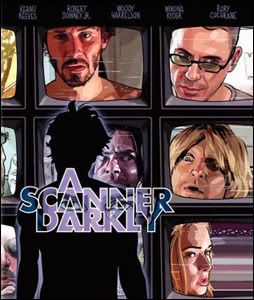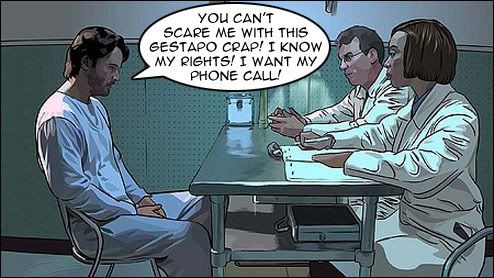 Starring:
Starring:Keanu Reeves, Woody Harrelson, Robert Downey, Jr., Wynona Ryder, Rory Cochrane
Director:
Richard Linklater
MPAA Rating:
R, for drug and sexual content, language, and a brief violent image.
Release Date:
July 28, 2006
Synopsis:
Sometime in the near future, Bob Arctor is an undercover police agent investigating the use of a drug called Substance D. He essentially befriends the people he is trying to bust, but as a result of his own drug addiction, he begins to lose his own mind.
My Two Cents:
I like Shin's format for reviews so I'll use it here. So this movie is based on the book of the same name by renowned and celebrated author Philip K. Dick. I have not read the book, but I gather the two formats are a lot alike. And that's part of the problem, really. I honestly had a very difficult time liking this movie at all. It didn't seem to have much of a real point at all except a generic 'this is how life should NOT be' view. Well, okay, that's fine. But if I am supposed to get more out of this movie, I don't get it. I didn't really sympathize with the characters, because I don't sympathize with people who decide to destroy themselves with drugs. This is basically what this movie is about. Now, anti-drug messages are fine with me. But this movie doesn't really take that approach even. It...focused a lot on the group of friends just....not really freaking out, but clearly not being in clear or understandable states of mind. Or at least, obviously altered states of mind. One of them begins having severe hallucinations and freak-outs, and also commits suicide.
The movie also very abruptly ends. We have Arctor being taken into rehab, and sent to work for the institution on a farm. You assume this is because Arctor is infiltrating the institution, and there is more of the movie in which he uncovers the truth and reveals it. But that doesn't happen. The movie ends with him being in custody and we don't know what happens to him after that. It just feels like this is not the end of the movie, that there is supposed to be more of the movie; like they didn't finish it or something. Maybe the book ends that way, too; I am not sure. But it doesn't feel right.
So what you find out about Arctor is that the two hemispheres of his brain are competing for dominance, and that seems to be the cause of his mental impairments. Now, this is a real disorder, so that in itself is not weird. But when I was watching the movie, I just assumed he was depressive, or at least melancholy, all the time because, uh, he's using drugs. That also made sense. It just...took too long to get to this point in the movie, because they were focusing more on the druggies...not doing anything important. There just wasn't something right about that because the movie didn't seem to have a point and it was taking too long to get to one.
It's also weird because Substance D is not defined or shown. At all. You have no idea what it looks like or how it's used, or what it's made of. What's good about this though is that it shows that you don't have to continuously show people using drugs to get the point across that they are addicts. But...the drug itself is not shown or described at all. Why is it called 'Substance D' anyway? What does the name mean or refer to?
The scramble suit is a neat, and odd, idea. It's a suit that flashes many, many different types of people and clothes at the same time and is always changing. They're used to conceal identities of people like Arctor, since he's an undercover agent, and...also a drug user...
There is one twist to this movie, and it surprised me, too. You really don't see it coming; when someone else in a scramble suit reveals their identity.

There also wasn't anything wrong with the acting. Everyone was fine, and played their parts well. I'm also going to refrain from making Robert Downey, Jr. jokes...
This movie was made in two ways, basically. The movie was filmed with all the actors; sometimes behind green screens, or partial green screens. Then, every frame was digitally painted over, so it looks like a CGI movie, but it only is somewhat. The characters were not made from scratch, no. The movie thus has a very stylized look, which I did like and appreciated.
However, it takes more than just pretty imagery to make a good movie. They might as well have not even bothered.
So even though this is a movie review, and not a video review, I have to mention that I did watch the special features on the disc, which would hopefully help shed light on what the point of this movie was... They did, or one did, rather. One feature has an old interview with Philip Dick, from 1977, in which he describes that the book is basically his reaction to...the Nixon Administration, and his participation in the 'counterculture'. I think he basically means the drug-abusing 'counterculture' of the 1960's that did seep into the early 1970's. It is true that Dick did have drug problems, which his own daughter admits to, in this feature as well. Dick is basically a paranoid man in this interview, describing that he 'knew' that...the government was watching him, for reasons he cannot name. He says his house has been broken into and ransacked before, and he 'knows' that whoever it was was looking for 'something', which he also cannot identify. First he says he has 'no doubt' (direct quote) that the government did break into his house, but then shortly after, in the same part of the interview, he says he doesn't know who did it. It's very unfortunate to see and hear, from his own mouth, how paranoid he was.
It's also explained that the original book was basically written as Dick expressing his pain over his own drug problems, and over the pain of his friends who also suffered from drug problems. The end of the movie does have text written by Dick, which may be in the book, in which he dedicates the work to several friends who suffered and/or died as a result from various ailments; probably from drug use. It is too bad to hear that such things did happen. I just didn't feel that when watching this movie; that this was about, or related to, Dick's own drug-related pain. It's one thing when you're reading a book written by the author's own hand, and you also read and understand it's about his pain. But that just didn't go over well into a movie, and doesn't seem to fit. This is where the two formats don't really relate well, even if the movie is a decent transfer from the book.
But in this feature, some of the cast and crew also claim...this movie is directly related times today, because as Wynona Ryder said, we're always being watched. She does not say by who, however. Other cast and crew say 'the current administration' is related to this kind of thing, and the movie applies to them as well.
So in other words, it sounds like Dick wrote the book because he was paranoid, and also suffering from drug-related pain and loss of loved ones, and the movie was made because the cast and crew are also paranoid....That's honestly the impression I got, and it makes me see this movie even less favorably than I already was.
Unfortunately, I thus really can't recommend this movie very much, if at all. I suppose Philip Dick fans will want to check it out, especially if they have read the book. But other people who are not familiar with Dick or his work may wonder some of the same things I did when I watched it, and see little real point to the movie. It has pretty pictures, sure, but that doesn't make the movie. Also, if I have to resort to the extra features in order to really figure out a main purpose for this movie, that's definitely not a good sign. It should be more clear than that.
Sorry, but I have to say this. This movie is largely... 'BOGUS!' I didn't say I wouldn't make a Keanu Reeves joke.












2 Comments:
We prefer Waking Life from Linklater and Bladerunner from Dick.
Yeah, I get the feeling people generally prefer Blade Runner, overall. It's already considered a classic movie, anyway.
Post a Comment